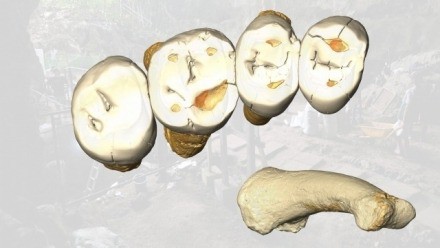via Nature Ecology and Evolution, 22 March 2021: Another genetics paper that suggests that human populations in Southeast Asia interbred with the mysterious Denisovans, but not with Homo floresiensis or Homo luzonensis.
The hominin fossil record of Island Southeast Asia (ISEA) indicates that at least two endemic ‘super-archaic’ species—Homo luzonensis and H. floresiensis—were present around the time anatomically modern humans arrived in the region >50,000 years ago. Intriguingly, contemporary human populations across ISEA carry distinct genomic traces of ancient interbreeding events with Denisovans—a separate hominin lineage that currently lacks a fossil record in ISEA. To query this apparent disparity between fossil and genetic evidence, we performed a comprehensive search for super-archaic introgression in >400 modern human genomes, including >200 from ISEA. Our results corroborate widespread Denisovan ancestry in ISEA populations, but fail to detect any substantial super-archaic admixture signals compatible with the endemic fossil record of ISEA. We discuss the implications of our findings for the understanding of hominin history in ISEA, including future research directions that might help to unlock more details about the prehistory of the enigmatic Denisovans.
See also:
- Island In South East Asia May Hold The Key To Humanity’s Interbreeding | IFL Science, 22 Mar 2021
- Fossil evidence of mysterious ‘southern Denisovans’ yet to be found | Natural History Museum UK. 22 Mar 2021
- New evidence in search for the mysterious Denisovans | The University of Adelaide, 23 Mar 2021
- Researchers May Have Found True Identity of Ancient ‘Hobbit’ Species | Gizmodo, 23 Mar 2021
- Researchers May Have Found True Origins Of ‘Hobbit’ Species: Study | Republic World, 23 Mar 2021
- New DNA Evidence in Search for the Mysterious Denisovans | Sci Tech Daily, 23 Mar 2021
- Evolutionary study suggests prehistoric human fossils ‘hiding in plain sight’ in Southeast Asia | The Conversation, 24 Mar 2021
- Hobbits (sort of) Existed, and they might be related to us | Syfy, 24 Mar 2021
























